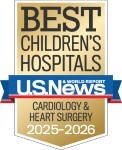About This Program
The Single Ventricle Program is a specialty program within the Texas Center for Pediatric and Congenital Heart Disease, a clinical partnership between Dell Children’s Medical Center and UT Health Austin.
The Single Ventricle Program diagnoses, treats, and manages the care of infants and children with single ventricle heart defects from prenatal life through adulthood. Single ventricle heart defects consist of a wide range of very complex disorders in which the heart cannot be used to pump the blood to both the lungs and the body. When this occurs, the heart is used only to move blood around the body while the surgical team uses a staged approach to create a path for the blood to flow to the lungs without a pump. These conditions put stress on the single ventricle to pump blood to the lungs and throughout the rest of the body. While we expect that most babies with a single ventricle heart defect will have a procedure at birth followed by a bidirectional Glenn shunt procedure at 4-6 months of age and a Fontan operation at 3-4 years of age, some children will require fewer or more procedures.
The Single Ventricle Program care team is comprised of nationally recognized and highly specialized physicians across different disciplines housed in a single cardiac care unit at Dell Children’s Medical Center. With access to expert staff and advanced technology, we provide a wide variety of services, from evaluation, testing, and diagnosis to medical management, home monitoring, rehabilitation, heart surgery, and more, to give patients and their families the best quality of life.

Through our clinical partnership with Dell Children's Medical Center, the Texas Center for Pediatric and Congenital Heart Disease program contributes to Dell Children's national recognition as one of the country's best specialty programs for Pediatric Cardiology and Heart Surgery by U.S. News & World Report in 2025-2026.
Treatment Approach
Most babies (not all) with single ventricle heart defects usually need treatment within the first few days to weeks of life to stabilize blood flow. If there is too much blood going to the lungs, the baby may need a pulmonary artery banding procedure to restrict the amount of blood going to the lungs. If the baby does not have enough pulmonary blood flow going to the lungs, they may need a Blalock-Thomas-Taussig shunt (BTT Shunt) or they may undergo placement of a ductal stent in the cardiac catheterization laboratory. Until the baby has their bidirectional Glenn shunt procedure (usually around 4-6 months), the heart is working very inefficiently, and the babies tend to be fragile. Those babies who do not need an initial procedure, will be closely monitored until the bidirectional Glenn shunt procedure. We have a dedicated Interdisciplinary Monitoring Program for Ambulatory Cardiac Care of Central Texas known as the IMPACT program, which is a home monitoring program for high-risk infants who are between the stages of their single ventricle palliation. The IMPACT program is devoted to monitoring and managing patients during these critical first few months.
The entire Single Ventricle Program care team rounds together and meets routinely to discuss how each baby is doing, what is going well, what needs additional attention, and overall goals for the upcoming week. While the team’s objective is to send the baby home with their family, this is not always possible before the second stage. If the baby is able to be discharged from the hospital, while they can expect to stay close to Dell Children’s for ongoing care during the period between operations, families are provided with education and support both before and after they leave the hospital. Our experienced and specialized cardiac care teams treat some of the most complex pediatric heart conditions in the world, and the cardiac care unit, cardiac catheterization (CATH) labs, and operating rooms manage urgent care needs 24/7. We are dedicated to an uncompromising quality of care and work with you and your family to ensure the best possible outcome for your child.
Patients are cared for by a dedicated multidisciplinary care team, meaning your child will benefit from the expertise of multiple specialists across a variety of disciplines. Our board-certified and fellowship-trained pediatric and congenital heart surgeons have extensive experience treating single ventricle defects and work alongside a team of pediatric cardiac experts, including cardiologists, interventional cardiologists, electrophysiologists, critical care specialists, hospitalists, anesthesiologists, perfusionists, nurses, advanced practice providers, social workers, psychologists, child life specialists, dietitians, physical and occupational therapists, pharmacists, and more, providing unparalleled care for patients and their families every step of the way.
Appointment Information
For more information about the Single Ventricle Program at Dell Children’s, please call 1-855-324-0091.